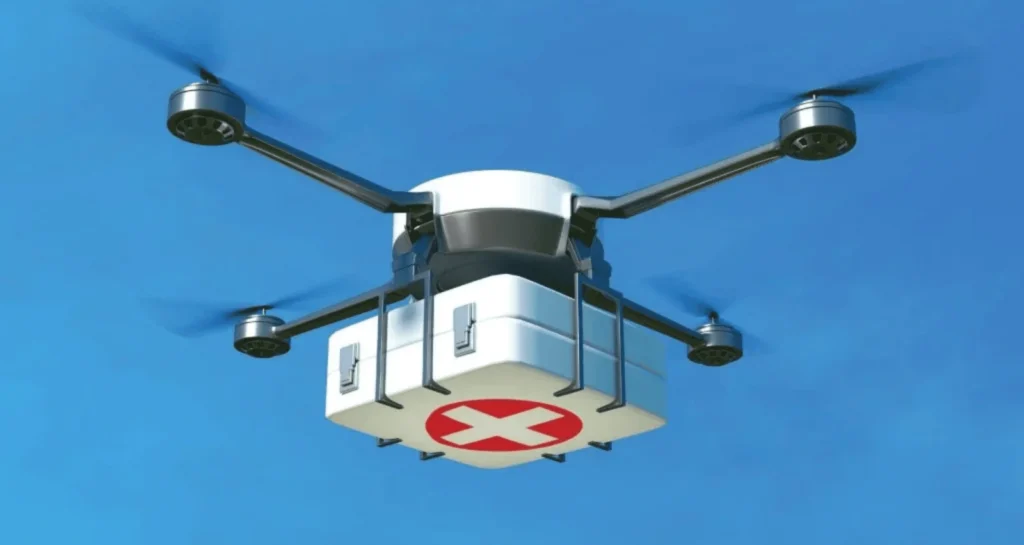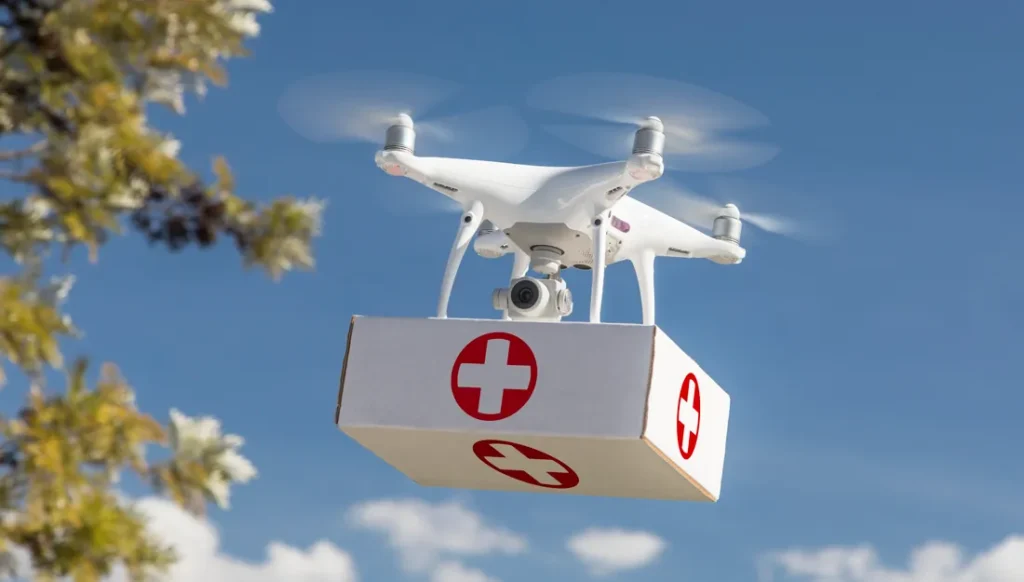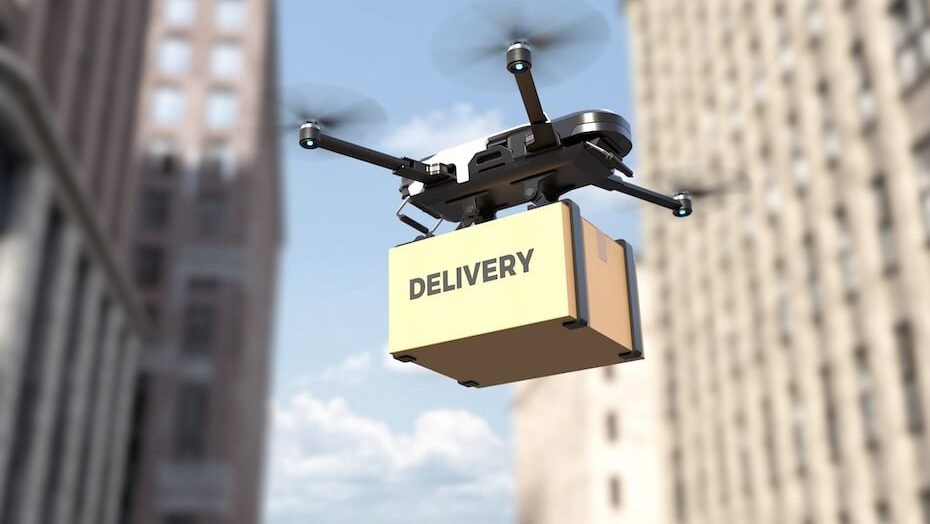Healthcare innovation is growing fast in Saudi Arabia, and one of the most exciting developments is the use of drones for medicine delivery. This new technology is helping to deliver medicines quickly and safely, especially to remote or hard-to-reach areas. Drones are becoming a vital part of the healthcare system in Saudi Arabia, making healthcare more efficient and accessible for everyone.
What Are Drones for Medicine Delivery?
Drones are small unmanned flying machines that can carry packages. In healthcare, drones are used to transport medicines, vaccines, and medical supplies from hospitals or pharmacies to patients or health centers. These flying machines help avoid traffic jams and reach areas where cars or trucks might take much longer to get.
In Saudi Arabia, where some areas are vast deserts or mountainous regions, drones offer a faster and more reliable way to deliver life-saving medicines. They reduce the time it takes for patients to get urgent medicines, especially in emergencies.

Why Saudi Arabia Is Leading in Drone Healthcare Innovation
Saudi Arabia has been investing heavily in modern technology as part of its Vision 2030 plan, which aims to transform many sectors including healthcare. The government encourages the use of smart technology to improve services. Drones for medicine delivery fit perfectly into this plan.
Several healthcare organizations and technology companies in Saudi Arabia have teamed up to develop and test drone delivery systems. The goal is to provide better access to healthcare, especially in remote towns, rural areas, and desert regions where traditional delivery methods can be slow or difficult.

Benefits of Using Drones for Medicine Delivery in Saudi Arabia

Drones bring many benefits to Saudi Arabia’s healthcare sector:
- Faster delivery times: Drones can fly over traffic and rough terrain, delivering medicines much quicker than road transport.
- Access to remote areas: Many villages and communities far from city centers can now get medicines without delays.
- Lower costs: Drones can reduce the need for expensive delivery vehicles and drivers.
- Reduced risk of contamination: Medicines delivered by drones are sealed and secure, reducing the chance of damage or contamination.
- Emergency response: In urgent situations like natural disasters or health crises, drones can deliver critical supplies rapidly.
Real-Life Examples of Drone Medicine Delivery in Saudi Arabia
Several pilot projects and programs in Saudi Arabia show how drones are already making a difference:
- Vaccine delivery: During the COVID-19 pandemic, drones helped deliver vaccines to distant health centers quickly and safely. This reduced waiting times and ensured vaccines were stored correctly.
- Blood and plasma transport: Drones are used to carry blood samples and plasma between hospitals, speeding up testing and treatment.
- Medicine delivery to isolated areas: In remote desert villages, drones deliver medicines that otherwise would take hours or days to arrive by car.
These successful projects are encouraging wider use of drone technology across the country.
Challenges Facing Drone Delivery in Saudi Healthcare
While the benefits are clear, there are also challenges to overcome:
- Regulatory approval: The Saudi government has set strict rules for drone flights to ensure safety and privacy. Companies must follow these regulations carefully.
- Weather conditions: Harsh weather such as sandstorms or high winds can affect drone flights.
- Technical limitations: Battery life and carrying capacity limit how far and how much drones can deliver at one time.
- Public acceptance: Some people are still unsure about drone technology and need time to trust it for their healthcare needs.
Efforts are ongoing to solve these problems by improving drone technology and working closely with regulators.
The Future of Drones in Saudi Arabia’s Healthcare System
The use of drones for medicine delivery is just the beginning. Experts believe drones will soon be used for many other healthcare services in Saudi Arabia, such as:
- Delivering medical equipment and diagnostic tools
- Transporting samples for lab testing
- Assisting in disaster relief and mobile health clinics
- Supporting telemedicine by delivering medicines after remote consultations
Saudi Arabia aims to expand drone delivery services nationwide and integrate them with hospitals, pharmacies, and health ministries.
How This Innovation Benefits Saudi Citizens
For patients, drone delivery means faster access to important medicines and healthcare supplies. This is especially helpful for people living in rural areas or those with limited mobility.
Healthcare providers can offer better and more timely care, improving patient outcomes and reducing hospital visits. The healthcare system overall becomes more efficient and responsive.
Global Impact and Saudi Arabia’s Role

Saudi Arabia is becoming a model for other countries in the Middle East and beyond, showing how drone technology can improve healthcare. This innovation could inspire similar projects worldwide, especially in countries with difficult geography or transportation challenges.
By leading in drone healthcare delivery, Saudi Arabia also promotes research, job creation, and technological growth in the region.
Conclusion: Drones for Medicine Delivery in Saudi Arabia Are Here to Stay
Drones for medicine delivery are transforming Saudi Arabia’s healthcare system. They bring speed, access, and reliability to patients across the country. While challenges remain, continued innovation and investment will ensure drones become a permanent and powerful tool in healthcare.
This technology shows how combining health and technology can create solutions that improve lives. Saudi Arabia’s leadership in drone medicine delivery marks a new era of healthcare innovation that benefits everyone.
Do follow UAE Stories on Instagram
Read More: King’s College School Wimbledon UAE Launches First Campus in Region












